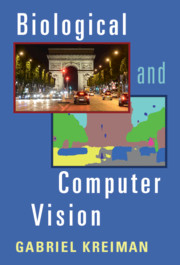Book contents
- Biological and Computer Vision
- Biological and Computer Vision
- Copyright page
- Dedication
- Contents
- Figures
- Preface
- Acknowledgments
- Abbreviations
- 1 Introduction to the World of Vision
- 2 The Travels of a Photon
- 3 The Phenomenology of Seeing
- 4 Creating and Altering Visual Percepts through Lesions and Electrical Stimulation
- 5 Adventures into Terra Incognita
- 6 From the Highest Echelons of Visual Processing to Cognition
- 7 Neurobiologically Plausible Computational Models
- 8 Teaching Computers How to See
- 9 Toward a World with Intelligent Machines That Can Interpret the Visual World
- 10 Visual Consciousness
- Index
- References
10 - Visual Consciousness
Published online by Cambridge University Press: 05 February 2021
- Biological and Computer Vision
- Biological and Computer Vision
- Copyright page
- Dedication
- Contents
- Figures
- Preface
- Acknowledgments
- Abbreviations
- 1 Introduction to the World of Vision
- 2 The Travels of a Photon
- 3 The Phenomenology of Seeing
- 4 Creating and Altering Visual Percepts through Lesions and Electrical Stimulation
- 5 Adventures into Terra Incognita
- 6 From the Highest Echelons of Visual Processing to Cognition
- 7 Neurobiologically Plausible Computational Models
- 8 Teaching Computers How to See
- 9 Toward a World with Intelligent Machines That Can Interpret the Visual World
- 10 Visual Consciousness
- Index
- References
Summary
As discussed in the last two chapters, there has been significant progress in computer vision. Machines are becoming quite proficient at a wide variety of visual tasks. Teenagers are not surprised by a phone that can recognize their faces. Self-driving cars are a matter of daily real-world discussions. Having cameras in the house that can detect a person’s mood is probably not too far off. Now imagine a world where we have machines that can visually interpret the world the way we do. To be more precise, imagine a world where we have machines that can flexibly answer a seemingly infinite number of questions on a given image. Let us assume that we cannot distinguish the answers given by the machine from the answers that a human would give; that is, assume that machines can pass the Turing test for vision, as defined in Section 9.1. Would we claim that such a machine can see? Would such a machine have visual consciousness?
Information
- Type
- Chapter
- Information
- Biological and Computer Vision , pp. 225 - 243Publisher: Cambridge University PressPrint publication year: 2021
